How Can Gastric Cancer Patients in Rural Areas Access Specialists?
How Can Gastric Cancer Patients in Rural Areas Access Specialists? from Patient Empowerment Network on Vimeo.
How can rural gastric cancer patients gain access to specialists? Expert Dr. Jun Gong from Cedar-Sinai Medical Center discusses access to additional medical consults and a way to access more Asian and Hispanic patient groups.
[ACT]IVATION Tip
“…for challenges faced with timely access to Asian and Hispanic subgroups and all racial groups, in my opinion, is to seek…it’s always appropriate to seek second or third opinions particularly at larger comprehensive cancer centers for the availability of clinical trials or whether it’s about questions about standard of care therapies or actually just questions about can we have a supportive service that you may offer that our local community providers may not offer?”
Download Resource Guide | Descargar guía de recursos
See More from [ACT]IVATED Gastric Cancer
Related Resources:
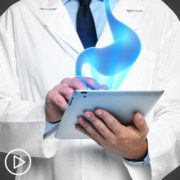
|
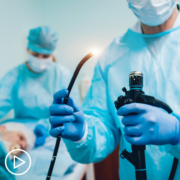
|
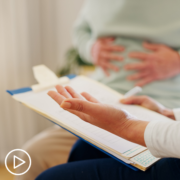
|
Transcript:
Lisa:
So there are maybe some patients who are in more rural communities or go to smaller cancer centers. You’re at a very large center that has a lot of these resources. Do you think there is some benefit to patients if they have the ability to have a consult done by a specialist like yourself who only see, or who sees mostly gastric cancer patients? Can they tap into that like as a one-time consult when they’re diagnosed, particularly if they have metastatic disease, and could they also tap into the resources of a larger center?
Dr. Jun Gong:
That is a great question, Lisa. And yes, we do do that. We, as part of a large urban medical center here, we have a great relationship with our community oncologist and primary care doctors and other subspecialists where we are often referred for a second opinion or a third opinion. Sometimes it’s really, is this the best treatment that I have? Or it’s simply a question of are there clinical trials because we would like to refer to an urban medical center, a larger comprehensive cancer center for clinical trial options.
And here what I would like to add is that the post pandemic period has really afforded, in my opinion, an easier way to do consultations. I know it’s specific to certain institutions and certain centers, but I actually am okay with virtual medicine consultations for those who are…who find it difficult to travel to an in-person visit, again, I can’t speak for all other cancer centers or oncologists, but we at least offer this ability to do that, to help with that barrier of transportation. And when they are connected with us sometimes if we are able to, we can even follow peripherally, almost like an extra care partner with the main local doctor who’s driving more of the day-to-day, and we’re providing our recommendations as an extension from an urban medical center.
Lisa:
Great. Thank you for that information. I know as a cancer patient and a patient advocate, I will always recommend seeking out a consult from another person just to have another set of eyes on, particularly if it’s a specialist like yourself who sees primarily that type of cancer. So, thank you.
Dr. Jun Gong:
My activation tip for challenges faced with timely access to Asian and Hispanic subgroups and all racial groups, in my opinion, is to seek…it’s always appropriate to seek second or third opinions – particularly at larger comprehensive cancer centers – for the availability of clinical trials or whether it’s about questions about standard of care therapies or actually just questions about can we have a supportive service that you may offer that our local community providers may not offer? Or can you help us in a later stage of our treatment? Not just a one-time consultation, really just raising awareness that we do have ancillary staff that are very, very, very helpful in terms of addressing a lot of these risk, healthcare access barriers.
The one thing I would’ve liked to add was I think involving church groups is a really, really great way for Asians and Hispanics, because they are so heavily invested in attending church services. And that’s one of the innovative approaches from the Cedars-Sinai perspective is that we actually have a disparity center, a center of community outreach where we are actually engaging both Asians and Hispanics and other racial groups with their leaders in the churches, the local churches, to actually educate and promote awareness.
Share Your Feedback
What Gastric Cancer Challenges Do Asian and Hispanic Groups Face?
What Gastric Cancer Challenges Do Asian and Hispanic Groups Face? from Patient Empowerment Network on Vimeo.
What kind of gastric cancer care barriers do Asian and Hispanic groups face? Expert Dr. Jun Gong from Cedar-Sinai Medical Center discusses specific barriers that are experienced by some patient groups and some solutions to overcome barriers.
Download Resource Guide | Descargar guía de recursos
See More from [ACT]IVATED Gastric Cancer
Related Resources:

|

|

|
Transcript:
Lisa:
What are the challenges faced by the Asian and Hispanic populations in accessing timely and appropriate treatment for stomach cancer and what strategies can be implemented to address these challenges?
Dr. Jun Gong:
There are several challenges that we see in our routine care of patients that are of Hispanic or Asian ethnicity with regards to access to treatment to stomach cancer. This often involves language barriers where, at least here geographically in Los Angeles, it’s a culturally diverse population, large metropolitan center where patients often speak non-English language. And this is often a barrier to communicating and getting timely access. Other concepts that we’ve come into as well is fear of insurance coverage denials in seeing the subspecialists or access to timely diagnostics and approval of treatments through insurance.
Other barriers include transportation. We have patients that actually have transportation issues. And although they try to take public transportation or whatever means necessary to get here, this still represents a formidable barrier to access. Other access related barriers that we often see is also caregiver support.
Here, patients are…stomach cancer is a quite complex illness. It can affect diet, it can affect strength. And so oftentimes these patients need more support to help with their daily activities as well. And so these are just a few of the growing kinds of risk factors or access related barriers that we’ve seen. How do we overcome this, is one of the major dilemmas right now in all of cancer care and medicine, in my opinion, not just exclusive to stomach cancer.
What I think is important here is advocacy groups. There are a lot of good stomach cancer advocacy groups such as the ones we’re participating under today. These can be accessed through public publicly available means either through word of mouth. They’re often health fairs that are a good place to distribute this.
I often think public libraries are also a great place for healthcare advocacy and connections. Obviously, the Internet is also one good means for doing this, but not all patients have internet access as well. So this is something that you also have to play into. As part of our clinical care team, we have our social worker and our case management teams that really comprise an important social, psychosocial resource to our patients where we do our best to connect them with advocacy support groups where we can connect them with resources such as transportation.
We certainly are more than happy to help with insurance related questions as well. And then another point I forgot to mention as well is that when you embark on treatment, sometimes patients are really debilitated and they’re not able to carry on their normal means of a living. And so here our supportive services teams within our cancer care team can really help with the financial impact of being on treatment such as chemotherapy for a period of time as well.
Share Your Feedback
Addressing Elevated Gastric Cancer Risks in Asian and Hispanic Communities
Addressing Elevated Gastric Cancer Risks in Asian and Hispanic Communities from Patient Empowerment Network on Vimeo.
How can higher gastric cancer risks for Asian and Hispanic populations be overcome? Expert Dr. Jun Gong from Cedar-Sinai Medical Center discusses H. pylori risk and screening and advice to patients to be proactive in their care.
[ACT]IVATION Tip
“…for the risk factors that are specific to the Asian and Hispanic populations is to understand the symptoms of H. pylori, which is one of the most common causes of stomach cancer, because they can be very effectively treated with antibiotics over a period of two weeks, oftentimes, and they’re very effective. This can be done at multiple provider levels from the primary care setting to the subspecialist setting. And also to know that symptoms, if they occur in family members that reside with the patient that is infected with h pylori or has stomach cancer, for them to be tested and the importance for their treatment as well.”
Download Resource Guide | Descargar guía de recursos
See More from [ACT]IVATED Gastric Cancer
Related Resources:

|

|

|
Transcript:
Lisa:
Dr. Gong, what can be done on an individual and systemic level to address the elevated risk for gastric cancer in the Asian and Hispanic populations?
Dr. Jun Gong:
To address the elevated risks for gastric cancer in Asian and Hispanic populations, I think it’s very important to understand what are probably some of the universal risks to both groups. And here, there’s been growing evidence that H. pylori infection affects both Asians and Hispanics and is one of the more pivotal risk factors to address on a systematic level. Here, there have been ongoing research where they’re just identifying H. pylori as a procedure and eradicating it with treatment.
This is usually with antibiotic containing treatment for about two weeks. And this imposes what we call a primary prevention method if we can actually eradicate one of the primary causes of stomach cancer. Is this the best way to address the greatest risk factor on a systematic level for Asians and Hispanics and other ethnic groups at high risk? On an individual level, I think again, this comes to tailoring what the diagnosis is with the respect of ethnicity of the patient and their cultural and their background as well as their familial background. Here, H. pylori, dietary lifestyle, hereditary causes are important to address, to minimize risk for stomach cancer.
And it’s also important to know that on the individual level, that family members that are living with patients with stomach cancer may also have what we call H. pylori incidence around the entire family. So it’s important to advise that sometimes your family members, because of the close living facilities and the shared utilities and restroom and how we dine together, that this shares a familial risk. And oftentimes it may need to be that your family needs to be treated if H. pylori is detected within the family as well.
Lisa:
So if a patient comes in and their family members are concerned, would it be advised that maybe their family members can go see their primary care provider and say, “Hey, my family member has gastric cancer. Will you test me for H. pylori? Is that…would that be a valuable question to ask?
Dr. Jun Gong:
So I think that raises the big question about should we systematically test all high-risk subgroups for H. pylori? And I think the jury is still out on that. There has to be formalized guidelines. What I recommend is family members who are with another family member that’s diagnosed with H. pylori and/or stomach cancer, if they are having any concerning symptoms of H. pylori infection, this is usually abdominal discomfort. It can actually be gastritis type symptoms of acid reflux. If you have any of those symptoms, then those are certainly indications for you to be tested either at the primary care level for H. pylori.
My activation tip for the risk factors that are specific to the Asian and Hispanic populations is to understand the symptoms of H. pylori, which is one of the most common causes of stomach cancer, because they can be very effectively treated with antibiotics over a period of two weeks, oftentimes, and they’re very effective. This can be done at multiple provider levels from the primary care setting to the subspecialist setting. And also to know that symptoms, if they occur in family members that reside with the patient that is infected with h pylori or has stomach cancer, for them to be tested and the importance for their treatment as well.
Share Your Feedback
How Does Gastric Cancer Screening Differ for High-Risk Groups?
How Does Gastric Cancer Screening Differ for High-Risk Groups? from Patient Empowerment Network on Vimeo.
Is gastric cancer screening different for some high-risk groups? Expert Dr. Jun Gong from Cedar-Sinai Medical Center shares how screening guidelines are evolving for some high-risk patient groups and advice to patients to ensure essential screening occurs.
[ACT]IVATION Tip
“…understanding whether you are in a specific high-risk subgroup it’s important to ask, whether diet and lifestyle can contribute to these risk factors are important to ask, and whether there is a risk of familial or hereditary causes of stomach cancer is important to ask as well. For us as oncologists to guide you to our supportive services and down the right path to address all of these concerns.”
Download Resource Guide | Descargar guía de recursos
See More from [ACT]IVATED Gastric Cancer
Related Resources:

|

|

|
Transcript:
Lisa:
Are there any screening tests that are recommended for anyone who might be in a group that’s known to have a higher incidence of gastric cancer?
Dr. Jun Gong:
Screening for stomach cancer in the U.S. is very evolving. It’s somewhat controversial. Unlike in East Asia and parts of the world where they’ve actually implemented standard endoscopic screening protocols as young as 40 or age 50. Here in the U.S., there hasn’t been any formal screening guidelines implemented for stomach cancer.
However, a lot of consensus groups recognize the high-risk subgroups of stomach cancer and in these risk factor, high-risk factor groups, especially if you have a family member a first-degree family member with stomach cancer or you’re a part of one of these ethnic groups that are at high risk, they do encourage screening to be discussed with your provider. And this can entail endoscopy surveillance as well.
So my activation tip regarding risk factors is to always inquire whether from your provider or from ancillary staff. It’s very common for us to refer our patients as well to cancer nutritionists, dieticians as well, in addition to going over what may be some possible familial or hereditary risk, if we sense that a strong family history is present.
And this is where referrals to genetic counselors are available. But understanding whether you are in a specific high-risk subgroup it’s important to ask, whether diet and lifestyle can contribute to these risk factors are important to ask, and whether there is a risk of familial or hereditary causes of stomach cancer is important to ask as well. For us as oncologists to guide you to our supportive services and down the right path to address all of these concerns.
Share Your Feedback
Do Gastric Cancer Risk Factors Differ Among Hispanic Communities?
Do Gastric Cancer Risk Factors Differ Among Hispanic Communities? from Patient Empowerment Network on Vimeo.
Are there gastric cancer risk factors that differ for Hispanic communities? Expert Dr. Jun Gong from Cedar-Sinai Medical Center discusses risk factors for Hispanic and other higher risk stomach cancer groups.
Download Resource Guide | Descargar guía de recursos
See More from [ACT]IVATED Gastric Cancer
Related Resources:
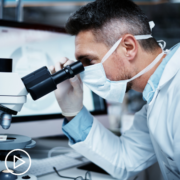
|

|
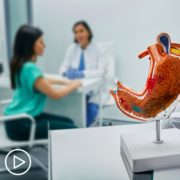
|
Transcript:
Lisa:
Are there any specific risk factors for gastric cancer that are more prevalent in Hispanic communities compared to other ethnic groups?
Dr. Jun Gong:
So this is an interesting question in terms of risk factors and certain ethnic groups. We’ve realized that actually gastric cancer is highly prevalent in East Asia. And there, the risk factors seem to be more diet-related. But then when you look on the Western side of the world, it’s different risk factors that exist for stomach cancer. You always have familial risk. These are genetic, ancestral, or hereditary causes of stomach cancer, which are fairly rare. And this is independent of geography.
But here on the West, we tend to see more of risk factors related to the Western lifestyle. Here, gastritis or chronic gastritis, heartburn, longstanding inflammation is a risk factor. Heavy smoking, heavy alcohol use, and obesity are emerging risk factors for stomach cancer as well. And also, we have a very unique risk factor in a bacteria called H. pylori that is known globally to be a risk factor for gastric cancer.
And we’ve done research on this in that although the demographics in the U.S. is very diverse, we do see that Asians and Hispanics and African Americans compose higher risk groups for stomach cancer when compared to non-Hispanic whites. And in certain ethnic groups such as the Koreans, it can be as much as five times the risk for non-Hispanic whites. And we think it is due to these unique variations in H. pylori risk across the different races. We’ve done research at Cedars-Sinai where we’re looking at the Hispanic population and we’ve seen over time that actually, in addition to Hispanic populations being at higher risk for stomach cancer, it seems to be affecting a younger group and in particular younger females.
So we’re looking into this kind of new epidemiologic evidence as to why stomach cancer in Hispanics is becoming younger in onset and tends to have a predilection for females. And these patients however, if they are afforded the correct treatment and the timely treatment, their outcomes are just as good as the non-Hispanic counterparts. So this is an emerging topic and a very important topic in my opinion.
Share Your Feedback
How Is Gastric Cancer Screening and Care Impacted by Culture?
How Is Gastric Cancer Screening and Care Impacted by Culture? from Patient Empowerment Network on Vimeo.
How can culture impact gastric cancer screening and care? Expert Dr. Jun Gong from Cedar-Sinai Medical Center discusses solutions for improving screening rates and patient advice for reducing barriers.
[ACT]IVATION Tip
“I think one of the most important things is always for providers to be culturally aware that certain ethnic groups may have certain preferences with how news is delivered, how news is handled, how treatment is decided upon.”
Download Resource Guide | Descargar guía de recursos
See More from [ACT]IVATED Gastric Cancer
Related Resources:

|

|

Do Gastric Cancer Risk Factors Differ Among Hispanic Communities? |
Transcript:
Lisa:
Dr. Gong, how do cultural beliefs and practices impact the prevention, diagnosis, and treatment seeking behavior of individuals with stomach cancer? And how can healthcare providers better address the cultural barriers to care?
Dr. Jun Gong:
Cultural beliefs have a huge impact on access to care in stomach cancer, and I think we can do better with addressing cultural barriers to care. I think one of the innovations here at our center is that we have a center of community outreach and a disparities core here where we recognize that certain cultures and this can expand beyond Asians and Hispanics into all racial groups, that there’s a heavily…there’s an important influence of church in this sector here.
And so what we do is we actively engage leaders in the churches, in the local churches for Asians, Hispanics, and a lot of different other subgroups. And we find this a great, great relationship and partnership to have for promoting awareness and educating patients about resources that we have within a culturally specific location where patients and family members find a great deal of trust in the church.
And we also have other innovations as well. So this is more from…more of a day-to-day lifestyle from a clinical trial, a research perspective here at Cedars, we also have a designated specialist from a diversity and inclusion research group where we actually move along the disease groups from stomach cancer to colon cancer to other cancer types.
And we have this specialist sit in, usually in our weekly meetings. And whenever there is a new study, a new clinical trial, this diversity inclusion specialist will raise the question, what racial groups, ethnic groups will be of interest to hear? And how can we expand outreach and participation in these clinical trials? So these are some of the innovations that I think we can do to address cultural barriers to care.
Lisa:
Dr. Gong, do you have an activation tip?
Dr. Jun Gong:
So, my activation tip is that yes, there are growing and emerging concepts to address cultural barriers. I think one of the most important things is always for providers to be culturally aware that certain ethnic groups may have certain preferences with how news is delivered, how news is handled, how treatment is decided upon.
And additionally, I think it’s important for patients and providers to promote awareness and education in a setting where patients and family members are very comfortable with. This can be the church setting as we recognize the importance of this in the day-to-day lives of many patients and family members across multiple cultures.
Share Your Feedback
What Early Phase Gastric Cancer Trials Are Showing Promise?
What Early Phase Gastric Cancer Trials Are Showing Promise? from Patient Empowerment Network on Vimeo.
What are the latest gastric cancer clinical trial developments in early phases? Expert Dr. Jun Gong from Cedar-Sinai Medical Center shares updates about early phase clinical trials and advice to patients for being proactive in their care.
[ACT]IVATION Tip
“…it’s never wrong to ask if there is any available clinical trial no matter what setting or stage of disease. Whether it’s early stage or advanced stage, it’s always appropriate to ask every provider, ‘Is there a clinical trial that you see may be eligible for me or that you believe to be a better option than certain standard of care options?”
Download Resource Guide | Descargar guía de recursos
See More from [ACT]IVATED Gastric Cancer
Related Resources:

|

|

Do Gastric Cancer Risk Factors Differ Among Hispanic Communities? |
Transcript:
Lisa:
Dr. Gong, can you speak to any early phase trials that have shown encouraging results for stomach or gastric cancer and in particular any of those related to metastatic disease?
Dr. Jun Gong:
So the exciting part about research in stomach or gastric cancer is that there are a lot of ongoing exciting developments in new treatment diagnostics almost every year. And so I think in terms of advanced or metastatic stomach cancer, some of the more exciting trials that have been ongoing and for which results are eagerly anticipated include novel targeted therapies. Here beyond HER2, MSI, EBV PD-L1. We’re looking at novel targets such as claudin. In fact, it is highly anticipated that the first claudin antibody will be available soon for all corners in the U.S. with the FDA approval of such a drug. The compound in question is called zolbetuximab, and here, it requires patients to be tested for claudin on their tumor biopsies. And this is a targeted therapy that’s able to be added to chemotherapy for patients with metastatic gastric cancer.
There are other novel targets such as FGFR2, which is a new target that has…also a targeted therapy that can be added to chemotherapy. This recently demonstrated exciting benefit in a Phase I/II clinical trial. Then we also have novel immunotherapies. We have early phase trials that are now investigating CAR T therapies targeting stomach cancer and specific markers of stomach cancer, including claudin as well. So those are some of the more exciting Phase I ongoing trials in the advanced stomach cancer setting. In the non-advanced or non-metastatic stomach cancer setting, they’re really trying to…the trials have really focused on trying to improve upon chemotherapy, leading up to surgery to derive better cures for stomach cancer. And here, the addition of immunotherapy to chemotherapy is an eagerly anticipated concept that is now playing out in clinical trials and in larger clinical trials and their final results are eagerly anticipated as well.
Lisa:
And do you have an activation tip, Dr. Gong?
Dr. Jun Gong:
My activation tip for this is it’s never wrong to ask if there is any available clinical trial no matter what setting or stage of disease. Whether it’s early stage or advanced stage, it’s always appropriate to ask every provider, “Is there a clinical trial that you see may be eligible for me or that you believe to be a better option than certain standard of care options?” And we as oncologists are always more than happy to look into these clinical trials and really give you guys a breakdown of what trials may or may not be considered.
Sometimes clinical trials, it’s important to realize that for a particular treatment setting, may not be available at our institution, but there are other institutions within the geography. If you are not geographically limited, even across the country where unavailable clinical trials may be available. We generally refer to what we call a master website. It’s called clinicaltrials.gov. And here it’s a very, in my opinion, patient friendly search engine where you can search your diagnosis and look at available clinical trials. And it’s very easy to have this streamlined approach and even filter out some trials that may not be eligible in collaboration with your doctor.
Share Your Feedback
Expert Guidance: Stomach Cancer Basics for Newly Diagnosed Patients
Expert Guidance: Stomach Cancer Basics for Newly Diagnosed Patients from Patient Empowerment Network on Vimeo.
What are stomach cancer basics for newly diagnosed patients to know? Expert Dr. Jun Gong from Cedar-Sinai Medical Center explains stomach cancer staging, where the cancer occurs, and advice for patients.
[ACT]IVATION Tip
“…ask the physician or care provider, ‘What is my stage of stomach or gastric cancer?’ and we will do our best to explain the stage.”
Download Resource Guide | Descargar guía de recursos
See More from [ACT]IVATED Gastric Cancer
Related Resources:

|

|

Do Gastric Cancer Risk Factors Differ Among Hispanic Communities? |
Transcript:
Lisa:
Dr. Gong, how do you explain stomach cancer to your newly diagnosed patients and care partners? And really important too, how do you explain disease staging to them?
Dr. Jun Gong:
So the way I explain stomach cancer or gastric cancer, is another term for this disease, to my patients is that we all are familiar somewhat with our organ that is the stomach. This is the organ that helps digest and process our foods. And it’s the organ that connects to the esophagus and then to the small bowel. And unfortunately, cancers can arise from this organ. And this is where it’s a little bit unique in the sense that unlike other cancers, the stomach is almost like a tube. It’s a hollow structure.
Unlike breast cancer, for example, where you can have a discrete mass where you can actually draw on a caliper and say this is 2 centimeters or 3 centimeters in dimension, stomach cancer tends to grow along the walls of this tube infiltrating to the inside of the lumen. Or it can even spread to the outside of the stomach as well.
And so this is how the staging is a little bit different for stomach or gastric cancer. And the way, instead of measuring by size, we measure how the depth of the infiltration of the tumor is along the thickness of the wall. And so the staging is similar to other cancer types where there’s a stage I, II, III, or IV connotation. And stage IV means that the cancer has spread outside the stomach and into distant sites such as the liver or lungs, while tumors of the stomach that are confined to the stomach and even to the lymph nodes around the stomach are still classified as I, II, or III. So this is a little bit about, a background, about how we explain what stomach cancer is and how the staging system works.
My activation tip for patients and care partners who are newly diagnosed with gastric or stomach cancers and are unsure about their stage is that it is always more than appropriate to ask the physician or care provider, “What is my stage of stomach or gastric cancer?” and we will do our best to explain the stage. And, of course, this is dependent oftentimes on the availability of information from a diagnostic workup. And how we stage the patient is usually dependent on imaging such as CT or MRIs or PET scans. And it’s often combined with ultrasound or endoscopic procedures such as an upper endoscopy or an endoscopic ultrasound, which is a specialized procedure that allows you to look within the thickness of the stomach to see how deep or how depth of the invasion of the stomach cancer is.
Share Your Feedback
PODCAST: Gastric Cancer: How to Access the Best Care and Treatment for YOU
Advances in gastric cancer research have led to more personalized therapy for patients. Dr. Yelena Janjigian discusses how biomarker testing can help guide a patient’s prognosis and treatment path, reviews currently available gastric cancer therapies, and shares tips for self-advocacy.
Dr. Yelena Janjigian is Chief of Gastrointestinal Oncology Service at Memorial Sloan Kettering Cancer Center.
See More From INSIST! Gastric Cancer
Transcript:
Katherine:
Hello and welcome. I’m your host, Katherine Banwell. Today’s program focuses on helping patients understand gastric cancer treatment options based on their individual disease. We’ll review the latest research and provide tips for self-advocacy to help patients access better care.
Before we meet our guest, let’s review a few important details. The reminder email that you received about this webinar contains a link to a program resource guide. If you haven’t already, click that link to access information to follow along during the webinar. At the end of this program, you’ll receive a link to a program survey. Please take a moment to provide feedback about your experience today in order to help us plan future webinars.
And finally, before we get into the discussion, please remember that this program is not a substitute for seeking medical advice. Please refer to your healthcare team about what might be best for you. Well, let’s meet our guest today. Joining me is Dr. Yelena Janjigian. Dr. Janjigian, welcome. Would you please introduce yourself?
Dr. Janjigian:
Thank you so much, Katherine, for this opportunity. My name is Yelena Janjigian. I’m a medical oncologist. And I oversee the GI oncology service at Memorial Sloan Kettering Cancer Center in New York. We’re a large group of doctors, over 40 physicians who treat everything from esophagus cancer to rectal cancer. And my research focus and my passion has been in developing new treatments for patients with stomach cancer, so I personally focus on this disease clinically and from research perspective.
Katherine:
Okay. Lovely.
Well, thank you so much for joining us today. I’d like to start by learning about the latest research news. Are there recent advances in gastric cancer that patients should know about?
Dr. Janjigian:
That’s a great question. The field of gastric cancer research has accelerated and evolved immensely over the last three years. We’ve had several important approvals for treatment of metastatic disease both for biomarkers selected population and immunotherapy targeted therapies. So, there’s been a lot of research, a lot of effort and some positive data that the patients and clinicians should be aware of.
Katherine:
And what excites you about the research you’re involved with?
Dr. Janjigian:
I’ve been focused on gastric cancer for nearly two decades. So, my recent advances have really helped to understand how we can improve patient’s survival better, potentially cure more patients, and understand the different subsets of cancer treatments and patients with gastric cancer understanding that not all gastric cancer is the same.
So, I think being able to zoom in on different subsets and target personalized approaches for each individual patient is why I stay in research, why I stay in gastric cancer research because we’ve been able to make some major breakthroughs.
Katherine:
That’s excellent news. How can patients stay up to date with treatment options?
Dr. Janjigian:
That’s a great question. And recently there’s been a lot of resources online through both the big pharma really educating patients with patient-friendly handouts. And many of my big recent papers when we publish them in big journals like Lancet or Lancet Oncology, for example, or JCO, there’s always a patient-friendly handout that comes with that data that helps patients understand some of the endpoints, how do we describe why this study is positive?
Or why is the FDA decided to approve the drug? So, there are many patient handouts that come with some of these papers. And it’s interesting, a lot of my patients come in. When they see me, they say, “Oh, it’s so good to finally meet you. I’ve watched a lot of your videos.” So, because of COVID actually, a lot of the scientific content that used to be just in in-person meetings behind doors for doctors, now it’s all online because a lot of these scientific presentations are now made for virtual content as well. So, patients have access to it. That’s double-edged sometimes. It’s a little bit of an information overload, and it may actually make patients feel more anxious than reassure them, right? Because it’s a lot of jargon and not too – but some patients find it helpful.
Katherine:
Yeah, I can see that. It can be a double-edged sword.
Dr. Janjigian:
Yeah.
Katherine:
Well, thank you for that advice. So, now that we’ve heard what’s happening in research, let’s review some more basic information about gastric cancer. First, gastric cancer is sometimes referred to as stomach cancer. Is that the same thing, or are both terms correct?
Dr. Janjigian:
Yeah. So, stomach is really where the cancer starts. But we can talk about stomach or abdomen. But gastric and stomach are the same tumor location basically. What’s interesting actually, some patients also have tumors that start at the bottom of their esophagus and extend into the stomach. So, biologically a lot of these cancers behave similarly. In fact, in United States the most common location for these cancers actually is in between the gastric esophageal junction and the stomach.
So, it’s in the location in of the cancer that’s at the very top of the stomach. But in short, stomach cancer and gastric cancer are interchangeable. And as I mentioned, for many of our viewers, actually gastro-esophageal junction is also part of the same disease.
Katherine:
Could you tell us what tests are used to diagnose gastric cancer?
Dr. Janjigian:
Most of our patients, when they come in to see me, by then the diagnosis of cancer has been made because I’m on oncologist.
In clinical practice, patients often present with vague symptoms or no symptoms at all. And that’s an important point for our clinicians to understand. In patients who have chronic acid reflux or have, for example, other risk factors such as H. pylori infection, often they end up getting endoscopy at the time, for example, for their first colonoscopy. So, the age of colonoscopy, the first colonoscopy has is getting earlier and earlier with each update, because colon cancer is increasing in incidents in younger adults. So, sometimes patients present and get first endoscopy, for example, which is an upper test with a camera when they’re getting their colonoscopies. In other patients, unfortunately, they present with more progressive symptoms. Often, it’s difficulty swallowing, regurgitation of food, and weight loss, which is obviously very dramatic.
And so they end up getting an endoscopy because of that and referred by their doctors.
Katherine:
How is gastric cancer staged? And what do the stages mean?
Dr. Janjigian:
Yeah. So, the most important part of the staging of gastric cancer and what patients ask me, “What is my risk of cancerous recurrence? What is my stage?” Really what it comes down to is the depth of invasion. So, it’s not only the size of the tumor, but how deep is it going into the muscle of the stomach, because stomach and your esophagus are basically a muscular bag, right? And so how deep is the invasion of the tumor into the wall? And also how likely are the lymph nodes to being involved? So, we assess it based on clinical symptoms such as swallowing difficulty and so forth. But in some patients, because the tumor is lower down in their stomach, they may not have very many symptoms, because there’s a lot more give in this muscular bag that our stomach is.
And so we test the endoscopic ultrasound to look at the depth of an invasion and also other X-ray type imaging such as a PET scan, a P-E-T scan or a CAT scan, which gives us a sense of tumor location whether or not we think the lymph nodes may be involved. And ultimately the final way to assess, especially in patients who are undergoing surgery, is their microscopic involvement of the lymph nodes? Because that often drives the likelihood of cancer coming back after surgery.
Katherine:
And how do the stages work for gastric cancer?
Dr. Janjigian:
So, in gastric cancer it’s either early, intermediate, or late stage. And this goes from stage I to IV. So, stage IV tumors is where most of the cancers are present. Over probably 50 percent of our patients present already at the time of diagnosis with more advanced stages.
Biologically this cancer just tends to move quickly. So, even in between endoscopies in patients who get endoscopies frequently, often it goes from 0 to stage III or IV because of the lymph node involvement and also spread of microscopic cells, right? Tiny, tiny cells before we even see them, they spread through the bloodstream to other organs or lymph nodes outside of your abdomen. So, that’s considered to be stage IV. And then early, early stage disease is stage I. Those usually that we can just scoop them out using endoscopic procedures. They don’t even need to have full surgery. And then stage II and III is usually if there’s some involvement of the tumor through the muscle or into the muscle of the stomach and also some lymph node involvement. But that’s how we stage it.
Katherine:
Okay. I’d like to move onto current gastric cancer treatment options. Can you provide an overview of what’s available now?
Dr. Janjigian:
Right. So, in patients with intermediate or early-stage tumors, really surgery is the main way to cure patients. Occasionally when we have an amazing response to chemotherapy or chemotherapy with immunotherapy or just immunotherapy, we can avoid surgery. But in most patients, surgery in early-stage disease is a gold standard for cure. Of course, it can be a very jarring thing to say to someone. “We have to take out. your stomach.” But patients do live without either fully their stomach removed or partially removed. And that’s the gold standard. We do additionally other treatments to help maximize chances of cure, but surgery is the main state. As I mentioned earlier, most of our patients, however, present with later stages where surgery is not feasible.
And when I say it’s not feasible, we would only attempt an operation if we thought there was a possibility of removing the cancer completely. Leaving some of the tumor behind, even if it’s only 1 percent of the cancer behind, makes patients unwell. They may not be able to tolerate additional chemo, so we do not recommend doing suboptimal surgery unless cancer can be completely removed. So, in those patients, we always explain the situation. And the disease is not potentially as curable, but it’s absolutely always treatable. And since the development of our immunotherapy options, really, we’ve changed the trajectory and the course of those cancers. We won’t know the stage or the final response to therapy until we’ve start it. But in those patients, usually a form of long-term therapy. Chronic treatment is very important.
And usually it involves a combination of chemotherapy and some targeted agents, biologic agents, meaning that they were designed in the lab to target the cancer specifically. And usually, they involve some sort of immunotherapy.
Katherine:
Excuse me. Can you go into some detail about the targeted therapies and immunotherapies that you use?
Dr. Janjigian:
Sure. So, conventional chemotherapy works on any rapidly dividing cell. And these are chemotherapies that have been tried and true in the clinic for decades, right? And they work still in gastric. And in particular they’re very important. And then over the last 10 years or so, we’ve started developing target agents in the lab that target the specific biologic tumor biomarkers. And when you think about tumor biomarkers, I would think about them as almost ZIP codes, right? How do you direct the cancer cell to die?
And how do you inhibit the cancer cell for the thing that is uniquely what’s making it grow as opposed to normal cells, right? So, that’s the difference between chemotherapy because chemotherapy can affect any rapidly dividing normal cell and cancer cell, while biologic agents ideally only affect the target, cancer, the cell. So, that’s why it’s very appealing to do both to help maximize response and survival on treatment. So, the biologic therapies that are available in and already approved in our disease for stomach cancer are something called HER2 directed treatments. And that’s been my focus in the lab. And then in my group has really spearheaded a lot of this research for HER2-positive tumors. In gastric cancer it occurs in up to 20 to 30 percent of tumors, but we have drugs such as trastuzumab or Herceptin, T-DXd, trastuzumab deruxtecan-nxki (Enhertu) or in HER2 that target these agents.
And furthermore, our work here at Memorial Sloan Kettering demonstrated the combination therapies really for HER2-positive disease has helped improve outcomes in those patients. So, that’s biologic therapy. Other biologic therapies that’s approved in gastric cancer is something called VEGFR-2 inhibitor. These are drugs that target blood vessel formation around the tumor to help the chemotherapy drugs work well and better. Those drugs are called ramucirumab or Cyramza. And that’s used in a combination of chemotherapy in second-line treatment. And there’s other drugs such as regorafenib (Stivarga) and other inhibitors that maybe have some targetable activity in our disease. And last but not the least is immunotherapy. So, immunotherapy’s a completely different class of drugs.
We think about immunotherapies, really the fundamental problem with cancer, right? The cancer issues that it started as a normal cell. So, at some point, it was a normal cell that then became and went awry and went rogue. And the body did not recognize that there was a problem. And the immune system did not eliminate that cancer cell. Before it started to metastasize and give us problems in their body, right? So, the fundamental question is why is the body’s immune system, why did it not recognize it as a abnormal cell? Well, because it really acts and looks like a normal cell from the immune perspective. Our immune system is trained not to hurt us, right? And that’s why in patients with rheumatoid arthritis or other autoimmune disorders, what happens is the immune system goes awry. So, what the immune checkpoint blockade or immunotherapy for cancer does, is it helps take some of those brakes off our immune system and help our immune system recognize the cancer and give it permission to say, “Hey, you know what?
You thought it was a normal cell. It’s not. It’s a cancer cell. Please help us eliminate it.” And that’s worked well because I think in for some of our patients, the immune system actually knows how to target and suppress the cancer much better than any of the fancy drugs we can design in the lab. And that’s why in some patients, immune checkpoint blockade immunotherapy has been such a game changer if you do respond, your duration and durability of response is so much more better than anything that would go to just done on our own in the lab or with other chemotherapies. So, it really is a nice way to think about it. And the patients feel like they’re part of the solutions. It’s always nice for them to have that.
But it’s been a real game changer for both HER2-positive and HER2-negative disease in combination with chemotherapy. I’ve had the pleasure of leading some of these studies. And it’s nice to be able to update the three or the four or the five-year survival rate from these studies in a disease where in the past most patients died within a year.
Katherine:
Dr. Janjigian, I’d like to talk about what goes into deciding on a best treatment for a patient. Is there testing that helps you understand a patient’s individual disease?
Dr. Janjigian:
One is an important factor about this disease, and when the patient comes in, the number one factor that helps us decide, what treatment to assign, is how well is the patient feeling? What are their nutritional deficits? How functional they are. Are they able to tolerate the treatment?
Because as an oncologist, the first rule is do no harm. Most patients come in when they’re first diagnosed are pretty well functional. They’re still able to eat. And so, they’re really up for the most aggressive. And that’s probably the number one wish I have from patients. I just want us to stay well and stay alive. So, we can be very aggressive with them, at least folks that come to see us in New York. And so, then the decision fork is really do you want only standard therapy, or are you interested in clinical trials? And I think what I am able to really explain to the patients, which is great, is that the benefit of trials – and, of course, you can never guarantee that a trial will be successful, right? Because that’s by definition – a clinical trial is experimental therapy. But for gastric cancer and stomach cancer where we need as many treatment options as possible, a clinical trial gives you an opportunity to try something different, and then go back to standard therapy, and then try experimental therapy, and then go back to standard therapy.
So, it gives you as many options as possible. The way that I help our patients visualize this is you’re trying to cross a very wide and somewhat turbulent river. And you need as many stepping stones as possible. And a clinical trial, if it makes sense for you and if you’re able to do it physically, it gives you that other option. The most important other factor is to understand which subset of stomach cancer you have, right? Because biomarker testing has helped us tremendously to advance this disease. If you look at and if you watch any of my talks, I usually have this timeline of therapeutic development in stomach cancer until really this past year.
We’re 2022, 2021. There was over a decade of negative trials, right? And the reason why I think is because the design of the trial really focused on targeting all the patients the same way. And now the trials are becoming more and more sophisticated. So, when we talk about the biomarker testing of the tumor, the patient’s specific tumor.
It’s important for the patient to ask their physician. “What is the status of my tumor?” And the four critical biomarkers are microsatellite instability, HER2, PD-L1, and Claudin-18.2. So, those four biomarkers have really helped us transform this field especially in patients with metastatic disease. And in all of the tertiary cancer centers, certainly here at Memorial Sloan Kettering, for each of the subsets we have a full research portfolio.
So the patients have both standard and experimental options available to them.
Katherine:
Well, how can test results like biomarker testing affect the patient’s prognosis and treatment options?
Dr. Janjigian:
It will depend on the treatment and how it is paired to the biomarkers. So, for example, a certain subset of tumors such as microsatellite and stable tumors are patients with PD-L1 high tumors or even patients with HER2-positive tumors. Now in clinical trials, we see that those patients have an outstanding dramatic response to combination therapies often with chemotherapy or immunotherapy together or even HER2 directed therapy with immunity therapy. So, it really will impact how likely your tumor is to shrink. And if the tumor is shrinking, and if you’re feeling better, obviously that translates to better survival.
Katherine:
Yeah. What questions should patients be asking about their test results?
Dr. Janjigian:
I think it’s important for patients to be very clear with their providers about their willingness to undergo repeated biopsies if needed.
I think the number one misunderstanding or misnomer that I see when patients come in to see me as a highly trained specialists, and they’re seeking me out for expertise and second and third and fourth opinions is that when the biomarker test is not done, often the answer in the community from the physician was, “Well, there was insufficient tissue or the tissue quality was not great, and that’s we’re going to do it. And it turns out the patient is perfectly willing and able to undergo a second biopsy. They really do not mind because a lot of times it’s just as simple as having a repeat endoscopy. Or even on treatment off and the problem is it’s a constantly evolving cancer. So, for example, if you receive first-line treatment and then you progressed and you need additional treatment, often it’s important to get a second biopsy to understand what your biomarkers are at that point.
And I described this to my patients. We can’t get into a battle with outdated maps. We need to know. And sometimes when there’s a misunderstanding, the doctors think, “Maybe the patient wouldn’t be willing to do it. Or they are risk-averse.” And the patient’s more than willing to do it. So, I think communicating your wishes and your intent clearly with your doctors and not being shy to ask questions, and also not being shy to seek out clinical trials, right? So, yesterday I was in clinic. I see a lot of this disease. I often see 30 patients at clinic. I had an 80-year-old patient in my clinic, right? And before you meet the patient, most doctors would think, “Well, it’s an elderly patient. They wouldn’t even be interested in clinical trials. What are we trying to accomplish here?”
Katherine:
Right.
Dr. Janjigian:
But this patient clearly is – he exercises five days a week. He’s extremely active. He wants the best options for him.
So, I am not an ageist, so I asked him. I said, “What are your sort of goals of this therapy? And how interested are you in clinical trials?” And him and the family were extremely enthusiastic. And, “We’re going to go for it, and we’re going to try.” So, I think having those conversations with your doctors – because you remember gastric cancer is very rare. In my clinic I see 30 patients, but in most normal sort of oncology practices, it’s lung, breast, and colon, the big three that sort of saturate the schedule of the oncologists. So, if they see one or two gastric cancers a month, they may not be thinking along the same lines of your disease. So, then you have to ask the questions of, “Are there any clinical trials? Should I see a specialist?” Did you do all of my biomarkers?
Katherine:
Yeah, yeah. That’s really great information to have.
Are there other decision factors involved in deciding on treatment options? You mentioned age, comorbidities. What else do you look at?
Dr. Janjigian:
Yeah, the other important factor as I said is nutrition. Being able to stay fit and stay independent is very important. Some of my patients ask me, and then they feel like what they eat is so important that as soon as they get their diagnosis, they restrict their diet. And then they start losing weight. And that’s not good. The number one negative prognostic factor is if you lose more than 10 percent of your body weight within the first few months of the diagnosis – because you get really weak, and then you can’t tolerate the chemotherapy. So, I tell the patients, “Your body will take from you whatever it wants. The cancer will take from you, from your body. So, you need to support yourself nutritionally.” So, if you don’t feel like eating a salad, but you are craving a cookie, it’s okay.
Have that cookie; just don’t lose weight. And I think that’s the number one. And also, the other factor is how do you communicate your diagnosis and your prognosis to your family and your friends? Because then everybody’s asking and making you in some ways anxious, your job. And what I tell patients is, “It’s on need-to-know basis.” If you find love and support, then you can tell people. Otherwise, you can just loosely kind of mention that you need some help, and you’re going through treatment without specific details. And the great part about these combination immunotherapies is that a lot of our functional patients actually continue to work through this. And so, we fill out whatever forms they need for their jobs and so forth. But we have lawyers that are continuing to work, teachers, and sometimes even construction workers. So, really, I would say make decisions as they come up.
Don’t run too far ahead and sort of assume that you’re going to not be well. But if you want to take some time off, that’s okay too. And so, I think the treatment paradigm for this disease has evolved so much that there’s a lot of misconceptions. And I think the job of a good oncologist is to let the patient live their life in as normal a fashion as possible. So, we work the chemo schedules around their schedule. Some of these immunotherapies you can give once a month. So, I have patients who will fly into see me, for example, get the dose, and then go back home. So, I think don’t be afraid to ask for what you need.
Katherine:
Yeah. Well, that leads us very smoothly into self-advocacy. And it’s really important that patients advocate for themselves. So, if a patient has a question or they’re unsure about a decision, why is it so important for them to speak up?
Dr. Janjigian:
What I always tell my patients and I explain to them, that often the doctors know a lot of information. But there’s so much information that it’s almost impossible to – and we only have 15 to 20 minutes together. So, it’s almost impossible to communicate everything that we know to you. So, you need to drive a bit of what the focus is of priorities in each visit and get as much information as you can. But also in some ways, follow the doctor’s lead. So, it’s a balance of information exchange. Use the portal as much as possible as well. The patient portal is often for follow-up questions. Write questions down. We have our nurse practitioners, our nurses, our fellows that continue to educate the patients because as things come up, and the field is so complicated that there are just so many things that you can ask at one single appointment.
So, it’s okay to forget something, but just write it down. In the end like anything else, you only have one sort of chance to do this in a way that you want it to be done. And as treatment progresses and you’re not feeling well, and maybe you don’t want to keep coming in for appointments and would rather go spend time in Aruba or Florida or somewhere sunny as opposed to – that’s okay. I think a lot of times it’s your life. You only have one. And I strongly believe in anything to try to get as much out of every interaction as possible using all the resources that are available to you.
Katherine:
Well, I’d like to close today with getting your thoughts on how you feel about the state of gastric cancer care. Are you hopeful about treatment options?
Dr. Janjigian:
I’m extremely hopeful. And usually, I finish all of my scientific talks. I’m a physician scientist.
I travel a lot to meetings. And my goal now in my career is to attract more and more young talent and scientists that will help us make the next wave of breakthroughs for this difficult disease. I think we’ve made a lot of progress, but the reality is: We’re still not curing enough patients. And so, our next wave is not just to stabilize and help people live longer but cure them definitively and permanently. And so, I finish every single presentation I have by how much the possibility and how fruitful this field has been. Personally, for my work and career of those that I’ve mentored throughout the years all over the world. So, I’m very hopeful for the next five, 10 years in this field. It will continue to get better.
Katherine:
It sounds very promising. Dr. Janjigian, thank you so much for joining us today.
Dr. Janjigian:
Thank you. Great question.
Katherine:
And thank you to all of our partners.
If you’d like to watch this webinar again, there will be a replay available soon. You’ll receive an email when it’s ready. And don’t forget to take the survey immediately following this webinar. It will help us as we plan future programs. To learn more about gastric cancer and to access tools to help you become a proactive patient, visit powerfulpatients.org. I’m Kathrine Banwell. It’s good to have you with us today.
How Can Gastric Cancer Patients Insist on Better Care?
How Can Gastric Cancer Patients Insist on Better Care? from Patient Empowerment Network on Vimeo.
Self-advocacy is an essential part of accessing the best gastric cancer care, so how can patients insist on better care? Dr. Yelena Janjigian shares advice to help optimize healthcare visits.
Dr. Yelena Janjigian is Chief of Gastrointestinal Oncology Service at Memorial Sloan Kettering Cancer Center.
See More From INSIST! Gastric Cancer
Related Programs:

|

|

|
Transcript:
Katherine Banwell:
Yeah. Well, that leads us very smoothly into self-advocacy. And it’s really important that patients advocate for themselves. So, if a patient has a question or they’re unsure about a decision, why is it so important for them to speak up?
Dr. Janjigian:
What I always tell my patients and I explain to them, that often the doctors know a lot of information. But there’s so much information that it’s almost impossible to – and we only have 15 to 20 minutes together. So, it’s almost impossible to communicate everything that we know to you. So, you need to drive a bit of what the focus is of priorities in each visit and get as much information as you can. But also in some ways, follow the doctor’s lead.
So, it’s a balance of information exchange. Use the portal as much as possible as well. The patient portal is often for follow-up questions. Write questions down. We have our nurse practitioners, our nurses, our fellows that continue to educate the patients because as things come up, and the field is so complicated that there are just so many things that you can ask at one single appointment.
So, it’s okay to forget something, but just write it down. In the end like anything else, you only have one sort of chance to do this in a way that you want it to be done. And as treatment progresses and you’re not feeling well, and maybe you don’t want to keep coming in for appointments and would rather go spend time in Aruba or Florida or somewhere sunny as opposed to – that’s okay. I think a lot of times it’s your life. You only have one. And I strongly believe in anything to try to get as much out of every interaction as possible using all the resources that are available to you.
Factors to Consider When Choosing a Gastric Cancer Treatment Approach
Factors to Consider When Choosing a Gastric Cancer Treatment Approach from Patient Empowerment Network on Vimeo.
What factors should be considered when choosing a gastric cancer treatment approach? Dr. Yelena Janjigian outlines key considerations that help determine the best treatment for an individual patient.
Dr. Yelena Janjigian is Chief of Gastrointestinal Oncology Service at Memorial Sloan Kettering Cancer Center.
See More From INSIST! Gastric Cancer
Related Programs:

|

|

How Do Biomarker Test Results Impact Gastric Cancer Treatment Options? |
Transcript:
Katherine:
Are there other decision factors involved in deciding on treatment options? You mentioned age, comorbidities. What else do you look at?
Dr. Janjigian:
Yeah, the other important factor as I said is nutrition. Being able to stay fit and stay independent is very important. Some of my patients ask me, and then they feel like what they eat is so important that as soon as they get their diagnosis, they restrict their diet. And then they start losing weight. And that’s not good. The number one negative prognostic factor is if you lose more than 10 percent of your body weight within the first few months of the diagnosis – because you get really weak, and then you can’t tolerate the chemotherapy. So, I tell the patients, “Your body will take from you whatever it wants. The cancer will take from you, from your body. So, you need to support yourself nutritionally.” So, if you don’t feel like eating a salad, but you are craving a cookie, it’s okay.
Have that cookie; just don’t lose weight. And I think that’s the number one. And also, the other factor is how do you communicate your diagnosis and your prognosis to your family and your friends? Because then everybody’s asking and making you in some ways anxious, your job. And what I tell patients is, “It’s on need-to-know basis.” If you find love and support, then you can tell people.
Otherwise, you can just loosely kind of mention that you need some help, and you’re going through treatment without specific details. And the great part about these combination immunotherapies is that a lot of our functional patients actually continue to work through this. And so, we fill out whatever forms they need for their jobs and so forth. But we have lawyers that are continuing to work, teachers, and sometimes even construction workers. So, really, I would say make decisions as they come up.
Don’t run too far ahead and sort of assume that you’re going to not be well. But if you want to take some time off, that’s okay too. And so, I think the treatment paradigm for this disease has evolved so much that there’s a lot of misconceptions. And I think the job of a good oncologist is to let the patient live their life in as normal a fashion as possible.
So, we work the chemo schedules around their schedule. Some of these immunotherapies you can give once a month. So, I have patients who will fly into see me, for example, get the dose, and then go back home. So, I think don’t be afraid to ask for what you need.
How Do Biomarker Test Results Impact Gastric Cancer Treatment Options?
How Do Biomarker Test Results Impact Gastric Cancer Treatment Options? from Patient Empowerment Network on Vimeo.
Biomarker test results comprise one of several factors that impact gastric cancer treatment options. Dr. Yelena Janjigian explains biomarker testing, key gastric cancer biomarkers that affect care, and other factors that may impact treatment decisions.
Dr. Yelena Janjigian is Chief of Gastrointestinal Oncology Service at Memorial Sloan Kettering Cancer Center.
See More From INSIST! Gastric Cancer
Related Programs:

|

|

|
Transcript:
Katherine:
Dr. Janjigian, I’d like to talk about what goes into deciding on a best treatment for a patient. Is there testing that helps you understand a patient’s individual disease?
Dr. Janjigian:
One is an important factor about this disease, and when the patient comes in, the number one factor that helps us decide, what treatment to assign, is how well is the patient feeling? What are their nutritional deficits? How functional they are. Are they able to tolerate the treatment?
Because as an oncologist, the first rule is do no harm. Most patients come in when they’re first diagnosed are pretty well functional. They’re still able to eat. And so, they’re really up for the most aggressive. And that’s probably the number one wish I have from patients. I just want us to stay well and stay alive. So, we can be very aggressive with them, at least folks that come to see us in New York. And so, then the decision fork is really do you want only standard therapy, or are you interested in clinical trials? And I think what I am able to really explain to the patients, which is great, is that the benefit of trials – and, of course, you can never guarantee that a trial will be successful, right? Because that’s by definition – a clinical trial is experimental therapy.
But for gastric cancer and stomach cancer where we need as many treatment options as possible, a clinical trial gives you an opportunity to try something different, and then go back to standard therapy, and then try experimental therapy, and then go back to standard therapy.
So, it gives you as many options as possible. The way that I help our patients visualize this is you’re trying to cross a very wide and somewhat turbulent river. And you need as many stepping stones as possible. And a clinical trial, if it makes sense for you and if you’re able to do it physically, it gives you that other option. The most important other factor is to understand which subset of stomach cancer you have, right? Because biomarker testing has helped us tremendously to advance this disease. If you look at and if you watch any of my talks, I usually have this timeline of therapeutic development in stomach cancer until really this past year.
We’re 2022, 2021. There was over a decade of negative trials, right? And the reason why I think is because the design of the trial really focused on targeting all the patients the same way. And now the trials are becoming more and more sophisticated. So, when we talk about the biomarker testing of the tumor, the patient’s specific tumor.
It’s important for the patient to ask their physician. “What is the status of my tumor?” And the four critical biomarkers are microsatellite instability, HER2, PD-L1, and Claudin-18.2. So, those four biomarkers have really helped us transform this field especially in patients with metastatic disease. And in all of the tertiary cancer centers, certainly here at Memorial Sloan Kettering, for each of the subsets we have a full research portfolio.
So the patients have both standard and experimental options available to them.
Katherine:
Well, how can test results like biomarker testing affect the patient’s prognosis and treatment options?
Dr. Janjigian:
It will depend on the treatment and how it is paired to the biomarkers. So, for example, a certain subset of tumors such as microsatellite and stable tumors are patients with PD-L1 high tumors or even patients with HER2-positive tumors. Now in clinical trials, we see that those patients have an outstanding dramatic response to combination therapies often with chemotherapy or immunotherapy together or even HER2 directed therapy with immunity therapy. So, it really will impact how likely your tumor is to shrink. And if the tumor is shrinking, and if you’re feeling better, obviously that translates to better survival.
Katherine:
Yeah. What questions should patients be asking about their test results?
Dr. Janjigian:
I think it’s important for patients to be very clear with their providers about their willingness to undergo repeated biopsies if needed.
I think the number one misunderstanding or misnomer that I see when patients come in to see me as a highly trained specialists, and they’re seeking me out for expertise and second and third and fourth opinions is that when the biomarker test is not done, often the answer in the community from the physician was, “Well, there was insufficient tissue or the tissue quality was not great, and that’s we’re going to do it.
And it turns out the patient is perfectly willing and able to undergo a second biopsy. They really do not mind because a lot of times it’s just as simple as having a repeat endoscopy. Or even on treatment off and the problem is it’s a constantly evolving cancer. So, for example, if you receive first-line treatment and then you progressed and you need additional treatment, often it’s important to get a second biopsy to understand what your biomarkers are at that point.
And I described this to my patients. We can’t get into a battle with outdated maps. We need to know. And sometimes when there’s a misunderstanding, the doctors think, “Maybe the patient wouldn’t be willing to do it. Or they are risk-averse.” And the patient’s more than willing to do it. So, I think communicating your wishes and your intent clearly with your doctors and not being shy to ask questions, and also not being shy to seek out clinical trials, right?
So, yesterday I was in clinic. I see a lot of this disease. I often see 30 patients at clinic. I had an 80-year-old patient in my clinic, right? And before you meet the patient, most doctors would think, “Well, it’s an elderly patient. They wouldn’t even be interested in clinical trials. What are we trying to accomplish here?”
Katherine:
Right.
Dr. Janjigian:
But this patient clearly is – he exercises five days a week. He’s extremely active. He wants the best options for him.
So, I am not an ageist, so I asked him. I said, “What are your sort of goals of this therapy? And how interested are you in clinical trials?” And him and the family were extremely enthusiastic. And, “We’re going to go for it, and we’re going to try.” So, I think having those conversations with your doctors – because you remember gastric cancer is very rare.
In my clinic I see 30 patients, but in most normal sort of oncology practices, it’s lung, breast, and colon, the big three that sort of saturate the schedule of the oncologists. So, if they see one or two gastric cancers a month, they may not be thinking along the same lines of your disease. So, then you have to ask the questions of, “Are there any clinical trials? Should I see a specialist?” Did you do all of my biomarkers?



